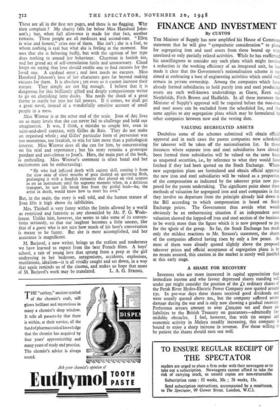FINANCE AND INVESTMENT
By CUSTOS
THE Minister of Supply has now amplified his House of Common:, statement that he will give " sympathetic consideration" to plans for segregating iron and steel assets from those bound up with unrelated or only partially related activities. While he has reaffirmed his unwillingness to consider any such plans which might involve a reduction in the working efficiency of an integrated unit, he has made it clear that the Government's nationalisation scheme is not aimed at embracing a host of engineering activities which could well remain in private ownership. Among the companies which have already formed subsidiaries to hold purely iron and steel producing assets are such well-known undertakings as Guest, Keen and Nettlefolds, Firth Brown and Hadfields. In all these instances the Minister of Supply's approval will be required before the non-iron and steel assets can be excluded from the scheduled list, and the same applies to any segregation plans which may be formulated by other companies between now and the vesting date. THE Minister of Supply has now amplified his House of Common:, statement that he will give " sympathetic consideration" to plans for segregating iron and steel assets from those bound up with unrelated or only partially related activities. While he has reaffirmed his unwillingness to consider any such plans which might involve a reduction in the working efficiency of an integrated unit, he has made it clear that the Government's nationalisation scheme is not aimed at embracing a host of engineering activities which could well remain in private ownership. Among the companies which have already formed subsidiaries to hold purely iron and steel producing assets are such well-known undertakings as Guest, Keen and Nettlefolds, Firth Brown and Hadfields. In all these instances the Minister of Supply's approval will be required before the non-iron and steel assets can be excluded from the scheduled list, and the same applies to any segregation plans which may be formulated by other companies between now and the vesting date.
VALUING SEGREGATED ASSETS Doubtless some of the schemes submitted will obtain official approval and in such cases the parent companies now scheduled for takeover will be taken off the nationalisation list. In those instances where separate iron and steel subsidiaries have already been formed these subsidiaries will be valued on the same basis as unquoted securities, i.e., by reference to what they would have fetched if they had been quoted on the Stock Exchange. Where new segregation plans are formulated and obtain official approval the new iron and steel subsidiaries will be valued as a proportion of the compensation as indicated by the takeover price now pro- posed for the parent undertaking. The significant point about these methods of valuation for segregated iron and steel companies is that they involve no departure from the principle already laid down in the Bill according to which compensation is based on Stock Exchange prices. The Government thus avoids what would obviously be an embarrassing situation if an independent asset valuation showed the lopped-off iron and steel section of the business to be worth more than the figure which it is now proposed to pay for the w,hole of the group. So far, the Stock Exchange has made only the mildest reactions to Mr. Strauss's statement, the shares of the companies affected having risen by only a few pence. As most of them were already quoted slightly above the proposed takeover prices and official acceptance of segregation plans is by no means assured, this caution in the market is surely well justified at this early stage.
A SHARE FOR RECOVERY
Investors who are more interested in capital appreciation than immediate income and who favour depressed shares standing well under par might consider the position of the Li ordinary shares of the Perak River Hydro-Electric Power Company now quoted around 13s. In pre-war days these shares received good dividends and were usually quoted above 20S., but the company suffered severe damage during the war and is only. now showing a gradual recovery. Preference arrears amount to over £200,000 net and there are liabilities to the British Treasury on guarantees—admittedly for- midable obstacles. I feel, however, that with tin output and economic activity in Malaya steadily increasing, this company bound to enjoy a sharp increase in revenue. For those willing to be patient the shares should turn out well.




































 Previous page
Previous page